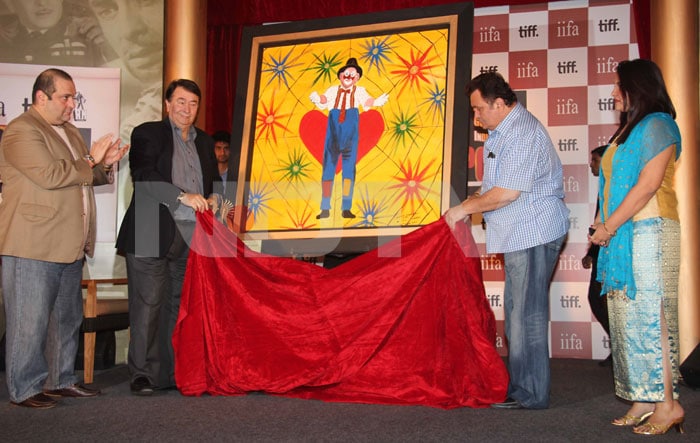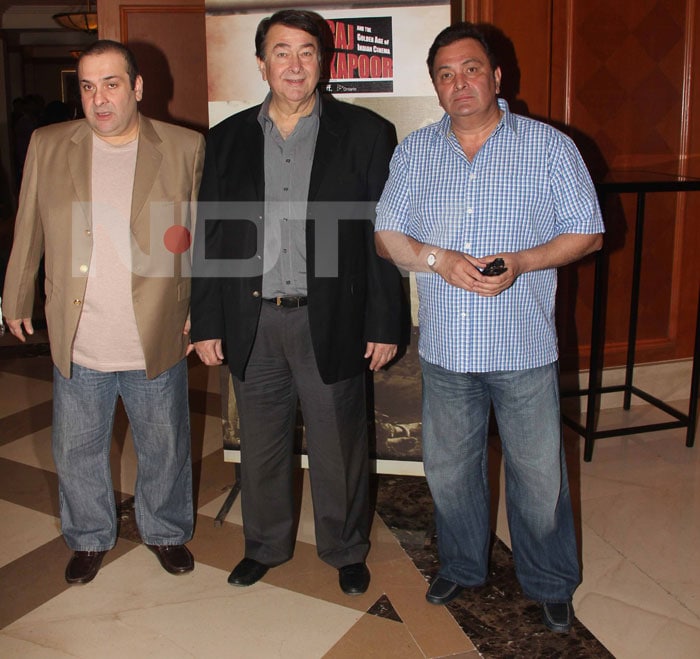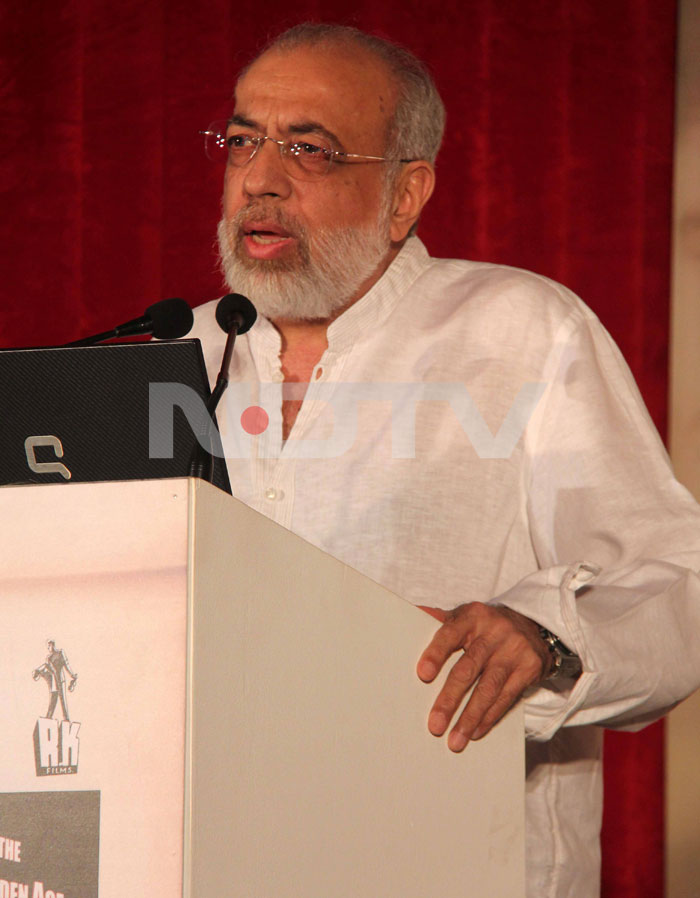A tribute to Raj Kapoor
Ranbirraj Kapoor, better known as Raj Kapoor, was born on December 14, 1924. He was the winner of eight Filmfare Awards, while his films Awaara (1951) and Boot Polish (1954) were nominated for the Palme d'Or at the Cannes Film Festival.
-
The International Indian Film Academy (IIFA) and Toronto International Film Festival (TIFF) announced their collaboration to host a tribute to the legend of Indian Cinema, Raj Kapoor.
It will be held on the 26th of June in Toronto, post the 12th IIFA celebrations in Canada.
The tribute will be followed by a retrospective film series called Raj Kapoor and the Golden Age of Indian Cinema, which will run for six weeks at the TIFF Bell Lightbox, TIFF's permanent home. (Photo Courtesy: Varinder Chawla) -
In 1946, at 22, Raj Kapoor married Krishna Malhotra belonging to Jabalpur, in a traditional family-arranged wedding. Krishna was a distant relative, his father's maternal uncle's daughter. She was 16 and he was 22. She was new to the Bombay (now Mumbai) environment and he was on the threshold of stardom. As his career graph ascended both as an actor then director and producer to studio-owner, she accepted the chores of a housewife and mother of his children. She played her part as hostess to his friends and business associates to such perfection that it is still considered a landmark of film parties like the ones hosted by Mrs Raj Kapoor. Her brothers Prem Nath as well as Rajindernath were also actors.
-
Raj Kapoor is also known to have had a longtime romantic relationship with the renowned actress Nargis, who later married veteran actor Sunil Dutt, during the 1950s. The couple starred in several films together, including Awaara and Shree 420. He worked with Nargis in almost 16 films including 6 of his own productions: Aag (1948), Andaz (1949), Barsaat (1949), Pyaar (1950), Jan Pahchan (1950), Awaara (1951) Amber (1952), Anhonee (1952), Ashiana (1952), Bewafa (1952), Aah (1953), Paapi (1953) Dhoon (1953), Shree 420 (1955), Chori Chori (1956) and Jagte Raho (1956).
-
When Raj Kapoor signed Nargis for Aag she was already a big star - his first meeting with her is immortalised in the film Bobby, the scene in which Raj (Rishi Kapoor) goes to Bobby's (Dimple Kapadia) house and she answers the door casually dressed, her hair dishevelled. (She later told her friends a "fat pinkie" had come to sign her!)
The Raj Kapoor-Nargis association lasted for years. She became Raj Kapoor's 'Lady In White', his inspiration, while doing some of her best films with him. (She is reported to have met the then Home Minister Moraji Desai to try and get him to sanction her marriage to Raj Kapoor, but she was turned down!) The couple reportedly broke up in 1957 after which she parted ways from the RK banner. It was Ab Dilli Dur Nahi, which came out in the year of the break-up, but it is considered the poorest of RK Films offerings. Clearly, the Nargis-Raj Kapoor combination was good for cinema, just as their break-up was bad for Raj Kapoor's cinema. While it lasted, it was the most celebrated love affair of the time. So perfect was the chemistry between them that even ordinary poses struck instinctively by them became classic images of India's entertainment lore. -
One of these poses became the famous logo of RK Films: Nargis flowing over the arm of a violin-bearing Raj. Another, a simple shot from Shree 420, showing the two of them sheltering under an umbrella in heavy rain, tugs at heartstrings for completely inexplicable reasons.
-
In 1948, at the age of 24, he established his own studio, RK Films, and became the youngest film director of his time. His first movie as a producer, director and star was the 1948 film Aag, which was also the first of his many films with actress Nargis. However the film failed to do well at the box office. In 1949 he once again starred alongside Nargis and Dilip Kumar in Mehboob Khan's classic blockbuster Andaz which was his first major success as an actor.
-
He went on to produce, direct and star in many box office hits such as Barsaat (1949). After Barsaat he made the most universally accepted socio-musical and romantic film with a very topical and strong message to world cinema about film standards in India, comprising the first ever father son combination, Awara (1951). Then came Shree 420 (1955), Chori Chori (1956) and Jis Desh Men Ganga Behti Hai (1960). These films established his screen image as The Tramp modeled on Charlie Chaplin's most famous screen persona.
-
In 1964 he produced, directed and starred in Sangam which was his first film in colour. This was his last major success as a leading actor. He moved onto directing and starring in his ambitious 1970 film, Mera Naam Joker, which took more than six years to complete. When released in 1970, it was however a box office disaster putting him into a financial crisis. Despite this setback, Raj himself regarded this film as his favourite.
-
He launched his second eldest son Rishi Kapoor's career when he produced and directed Bobby (1973), which was not only a huge box office success but also introduced actress Dimple Kapadia and was the first of a new generation of teen romances. Dimple wore bikinis in the film which was quite unique for Hindi films then.
-
Jis Desh Mein Ganga Behti Hai in 1960 had the usual formula ingredients, but was without the easy spontaneity that made his earlier movies so heart-warming. This film pointed to a fundamental shift in Raj Kapoor's very approach to cinema. He now found resorting to tawdry sex appeal necessary.
-
In the latter half of the 1970s and early 1980s he produced and directed films which focused on the female protagonists: Satyam Shivam Sundaram (1978) with Zeenat Aman, Prem Rog (1982) with Padmini Kolhapure and Ram Teri Ganga Maili (1985) which introduced Mandakini. His women were always show to be very strong and were more carved out than his male protagonists.
-
If romance was the core of Kapoor's rebellion as a hero, then it was the hallmark of his attitude as a director too. This romanticism was specially evident in his treatment of women. The heroine has always been the central player in his films. In Sangam (1964), she was Radha (Vyjayantimala), the vortex of the triangular affair. In Mera Naam Joker (1970), she was the temptress who broke the simpleton's heart time and again. In Bobby (1973), she was the pubertic, proletarian kid who caused the hero to cross all barriers of class, family and life itself. In Satyam Shivam Sundaram (1978), she was the temple singer who defined the true concept of beauty for all and sundry, specially a husband who mistakenly believed in the lure of superficial gloss alone. In Prem Rog (1982), she was the vulnerable young widow who laid down the need for a change in social customs. Widows should be given a second chance, she cried out with stark simplicity. Widows mustn't be buried alive with their dead husbands, she whimpered, laying the case for a leniency in religious customs and codes. Love must never be suppressed, screamed Kapoor, the prophet of this primordial emotion.
-
It wasn't accidental that Kapoor's heroine's were by and large portrayed as victims. In Satyam Shivam Sundaram, Zeenat spent her life in the shadows and was willing to be humiliated by a husband who rejected her for a superficial disfigurement on her face. All this wilting and waiting upon on an errant, arrogant and brutal husband, without ever questioning or curbing her love for him.
While making Prem Rog, he had pointed out that he enjoyed making the film because it was purposeful and had a strong and definite comment to make. This was essentially a statement and a definition of Indian womanhood and its rightful social status. -
In Ram Teri Ganga Maili, she is subjected to a one-night wedding by a tourist-husband (Rajiv Kapoor) and spends the rest of the film time as a helpless single mother who is forced to be in a brothel, in search of her infant's missing father. Only to find him settling down to a new betrothal. Again, Ganga, despite her exploited situation is quite helpless and undemanding of her rightful due. All she does is simply dance on her lover's wedding day and that, too, with a long veil which covers her face and decorously contains her agony. Thus, the women in Kapoor's films have, by and large, never aggressively cried out for justice and atonement. On the contrary, they have been more than willing to silently scuffle and sob in the shadows as silent victims of male injustice. And the fact that they have always been rescued and redeemed by the hero conveniently tilts back the equilibrium to status quo by proving that there are no inherent contradictions in the gender balance nor are there any inconsistencies in social attitudes sanctified by religion. Men, as a rule, are not biased. And traditional gender politics is actually not inimical to feminine bliss. For a good husband, a good father always puts the woman in her rightful place - on the pedestal. Quite forgetting the simple fact that pedestals are meant for divinity, not demanding/ thinking, feeling, questioning individuals.
-
Raj Kapoor is appreciated both by film critics and ordinary film fans. Film historians and movie buffs speak of him as the Charlie Chaplin of Indian cinema, since he often portrayed a tramp-like figure, who, despite adversity, was still cheerful and honest.
-
Many of Raj Kapoor's movies had a patriotic theme. His films Aag, Shree 420 and Jis Desh Men Ganga Behti Hai celebrated the newly independent India, and encouraged film-goers to be patriots. Raj Kapoor commissioned these famous lyrics for Mera Joota Hai Japani, a song from the movie Shree 420.
-
Three of Raj Kapoor's grandchildren are big Bollywood stars. His granddaughters are actresses Karisma Kapoor and Kareena Kapoor, daughters of Randhir Kapoor by his ex-Wife wife Babita. Karisma Kapoor is married to industrialist Sanjay Kapur and they have a daughter Samaira. Karisma though has quit acting but has been busy doing ads and acting as reality show judge.
Meanwhile, Kareena Kapoor is today's leading actress. -
Raj Kapoor's another grandson is actor Ranbir Kapoor, son of Rishi Kapoor and his wife Neetu Singh. Ranbir Kapoor who made his acting debut in a Sanjay Leela Bhansali film is being touted as the next big thing in Bollywood. In his career of six film old career, he has given hits like Bachna Ae Haseeno, Wake UP Sid, Ajab Prem Ki Ghazab Kahani and most recent Rocket Singh- Salesman of the Year.
-
Raj Kapoor's daughter Ritu Kapoor (aka Nanda) married Rajan Nanda, the Chairman and Managing Director of Escorts in Bombay on February 1, 1969. The couple has two kids elder daughter Nitasha and a son Nikhil Nanda.
Nikhil is married to legendary Amitabh Bachchan's daughter Shweta Bachchan. The couple has two kids, daughter Navya Naveli and son Agastya. -
Raj Kapoor was awarded the 35th Dadasaheb Phalke Award in 1987 for his lifetime contribution to the Indian cinema and it was at this ceremony that he collapsed. He suffered from asthma in his later years an died of complications related to asthma in 1988 at sixty-three years of age.










































